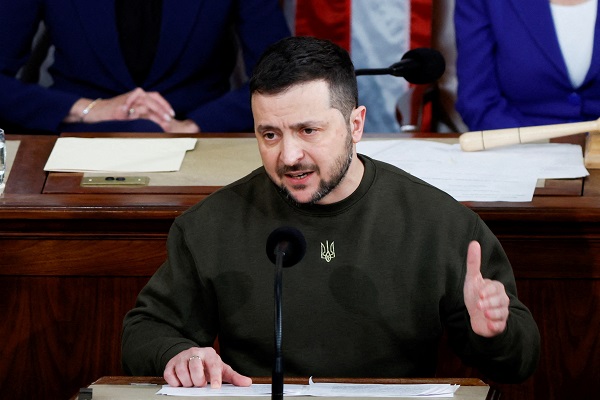 Ukraine's President Volodymyr Zelensky addresses a joint meeting of the US Congress in the House Chamber of the U.S. Capitol in Washington, US, on 21 December 2022.;
Credit: REUTERS/Evelyn Hockstein
Ukraine's President Volodymyr Zelensky addresses a joint meeting of the US Congress in the House Chamber of the U.S. Capitol in Washington, US, on 21 December 2022.;
Credit: REUTERS/Evelyn Hockstein
(Reuters) - Ukraine's President Volodymyr Zelensky has been vigorously promoting his 10-point peace plan, discussing it with US President Joe Biden among others, and urging world leaders to hold a Global Peace Summit based on it.
Here is an explainer on the plan and world reaction:
WHAT IS ZELENSKY'S 10-POINT PEACE PLAN?
Zelensky first announced his peace formula at a November summit of the Group of 20 major economies.
The plan calls for:
1. Radiation and nuclear safety, focusing on restoring safety around Europe's largest nuclear power plant, Zaporizhzhia in Ukraine, which is now-Russian occupied.
2. Food security, including protecting and ensuring Ukraine's grain exports to the world's poorest nations.
3. Energy security, with focus on price restrictions on Russian energy resources, as well as aiding Ukraine with restoring its power infrastructure, half of which has been damaged by Russian attacks.
4. Release of all prisoners and deportees, including war prisoners and children deported to Russia.
5. Restoring Ukraine's territorial integrity and Russia reaffirming it according the UN Charter, which Zelensky said is "not up to negotiations".
6. Withdrawal of Russian troops and cessation of hostilities, restoration of Ukraine's state borders with Russia.
7. Justice, including the establishment of a special tribunal to prosecute Russian war crimes.
8. Prevention of ecocide, need for protection of environment, with focus on demining and restoring water treatment facilities.
9. Prevention of escalation of conflict, and building security architecture in the Euro-Atlantic space, including guarantees for Ukraine.
10. Confirmation of the war's end, including a document signed by the involved parties.
WHAT IS ZELENSKY'S GLOBAL PEACE SUMMIT PROPOSAL?
In December, Zelenskiy urged the leaders of the Group of Seven nations to support his Global Peace Summit idea in winter that would focus on the peace plan "as a whole or some specific points in particular".
WHAT HAS BEEN THE WORLD'S RESPONSE?
Russia rejected Zelensky's peace proposal this month and Moscow reiterated on Tuesday that it would not give up any territory it has taken by force, around a fifth of Ukraine, which it says it has annexed.
Zelensky has been on a diplomatic flurry presenting his plan to leaders including Biden, French President Emmanuel Macron and India's Prime Minister Narendra Modi, whose country has assumed the G20 presidency.
The Western world's support for Ukraine's military has run into billions of dollars, led by Washington, and nations have rushed to help Kyiv with demining and fixing power infrastructure.
But response to Zelensky's peace plan and his proposed peace summit has been more cautious.
During Zelensky's visit to Washington on 22 December, Biden said in public remarks only that he and Zelensky "share the exact same vision" for peace and that the United States is committed to ensure that Ukraine can defend itself.
The G7 leaders said they were committed to bringing peace to Ukraine "in line with its rights enshrined in the UN Charter."
UN Secretary-General Antonio Guterres said that chances for any peace talks are small any time soon. "I do believe that the military confrontation will go on, and I think we'll have still to wait for a moment in which serious negotiations for peace will be possible," he said in late December.








